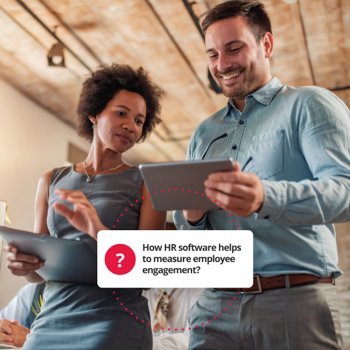
What is employee engagement?
Employee engagement refers to the emotional commitment and enthusiasm employees have towards their work, colleagues and organisation. It’s not just about job satisfaction. It’s about how invested employees are in contributing to the company’s success.
When businesses measure employee engagement, they assess factors such as:
- Motivation
- Loyalty
- Involvement with organisational initiatives.
Engaged employees tend to be more productive. They are more likely to stay with the company longer and contribute to a positive working environment. Tracking engagement levels helps organisations to identify areas for improvement and enhance the overall employee experience.
Why measure employee engagement?
Increases productivity
Employee engagement has a direct impact on productivity. Engaged employees are more motivated to achieve their goals and contribute to the company’s success. When businesses use HR software to improve productivity, it empowers them to use data-driven insights to optimise workflows and enhance employee performance.
Boosts staff retention
High engagement levels often lead to lower staff turnover rates. When employees feel valued and connected to the organisation, they’re less likely to seek opportunities elsewhere. By tracking engagement throughout the employee lifecycle, businesses can implement strategies that foster long-term loyalty and reduce recruitment costs.
Improves customer satisfaction
Happy employees lead to happy customers. Engaged employees are more likely to provide exceptional customer service. This creates positive experiences that enhance customer satisfaction. This connection between engagement and customer satisfaction highlights the importance of building a motivated workforce.
Informs HR strategies
Engagement data is a valuable resource for shaping HR strategies. By analysing trends and feedback, businesses can develop targeted initiatives that address specific employee needs. Incorporating these insights helps to ensure that decisions are grounded in real data, leading to more effective outcomes.
What employee engagement metrics should you measure?
To gain a good understanding of employee engagement, businesses need to track various metrics. When you measure employee engagement, focusing on these key indicators can provide actionable insights into employee morale, performance and overall satisfaction.
Employee satisfaction
Measuring employee satisfaction is essential for understanding how happy employees are with their roles, working environment and leadership. Using the right employee satisfaction survey questions can reveal areas where improvements are needed, helping to enhance the overall employee experience.
Turnover rates
Turnover rates are a strong indicator of engagement. High turnover often signals dissatisfaction or disengagement, while low turnover suggests a committed workforce. Tracking staff turnover helps businesses to identify potential issues early and proactively implement retention strategies to keep employees engaged.
Promotion rates
Promotion rates reflect the growth opportunities available within an organisation. High promotion rates often indicate a culture of development and recognition, which in turn boosts engagement. Using a performance management system can help to track and analyse these trends, ensuring that employees feel valued and motivated to progress.
Absenteeism
High levels of absenteeism can be a sign of low engagement or job dissatisfaction. By monitoring attendance patterns and using tools to calculate absenteeism rate, businesses can address underlying issues and create a more supportive working environment.
Productivity metrics
Tracking productivity provides insights into how efficiently employees are performing their tasks. Metrics for tracking productivity include measuring output, task completion rates, and overall effectiveness. By understanding how to measure employee productivity at work, businesses can gain a clearer understanding of their workforce’s performance.
How do you measure employee engagement?
Effective measurement involves using various tools and methods to gather comprehensive data about engagement levels. When you measure employee engagement, it’s important to use both quantitative and qualitative approaches to capture a full picture of the workforce’s sentiment and involvement.
Annual employee engagement surveys
Annual engagement surveys offer a comprehensive way to gather feedback from employees on various aspects of their work experience. By using an engagement survey, businesses can identify trends and areas for improvement, enabling them to take informed action.
Pulse surveys
Pulse surveys are shorter, more frequent surveys designed to capture real-time feedback on specific issues or initiatives. These quick snapshots allow businesses to track engagement levels regularly and make timely adjustments. Implementing pulse surveys keeps your engagement strategy dynamic and responsive.
Employee Net Promoter Score (eNPS)
The Employee Net Promoter Score (eNPS) measures how likely employees are to recommend their workplace to others. This metric provides insight into overall employee satisfaction and loyalty. Integrating net promoter score into engagement assessments can help to gauge the strength of the company culture.
Performance appraisals
Performance appraisals offer a valuable opportunity to assess engagement through direct feedback and goal-setting discussions. By incorporating performance appraisals into engagement measurement, businesses can align individual objectives with broader organisational goals, helping to create a more engaged workforce.
How does HR software help to measure employee engagement?
HR software simplifies the process of tracking and analysing engagement data. It provides real-time insights and actionable recommendations. Businesses exploring how to measure employee engagement can benefit from the automation and centralisation that HR software offers. This ensures consistent and efficient engagement strategies.
Streamlining communication
HR software enhances communication by offering centralised platforms for sharing updates, collecting feedback and encouraging collaboration. This improves workplace communication, ensuring that employees feel informed and connected, which is crucial for maintaining high levels of engagement.
Delivering real-time feedback
Real-time feedback helps employees to stay aligned with their goals and feel valued for their contributions. By incorporating 360 feedback tools, HR software enables continuous performance discussions, boosting engagement and motivation across teams.
Offering performance management tools
Performance management tools within HR software allow businesses to set, track and evaluate employee goals efficiently. These tools, often part of a performance management system, ensure that employees receive regular feedback and recognition, helping to drive higher engagement.
Supporting learning and development opportunities
Engaged employees thrive in environments that offer growth opportunities. HR software that incorporates e-learning at work modules can empower employees to upskill, enhancing both their personal development and overall engagement levels.
Increasing employee autonomy
Giving employees the tools to manage their own tasks, schedules and development creates a sense of ownership and responsibility. HR software that promotes autonomy at work helps employees to feel more in control, leading to increased engagement and satisfaction.
Implementing recognition and rewards
HR software that integrates recognition and reward systems can motivate employees by acknowledging their achievements. By applying motivation theory, these tools encourage continuous effort and engagement, reinforcing a positive working culture.
Providing access to employee benefits
HR software offering seamless access to flexible benefits helps employees to feel supported and valued. Simplifying benefits management through digital platforms ensures that employees can easily access the resources they need, boosting both satisfaction and engagement.
Measure employee engagement effectively with PeopleHR
Understanding how to measure employee engagement is essential for creating a motivated and productive workforce. By tracking key metrics, gathering real-time feedback and leveraging HR software, businesses can enhance their engagement strategies and foster a positive working environment
Our HR software offers comprehensive solutions to streamline this process, providing the tools needed to measure and improve engagement. Try our demo to see our solutions in action for yourself, or contact us today if you’re looking for tailored advice.
